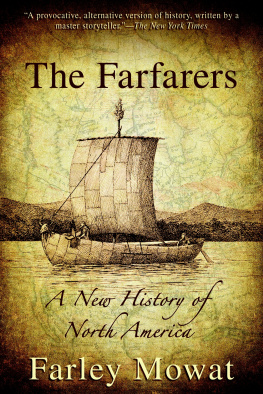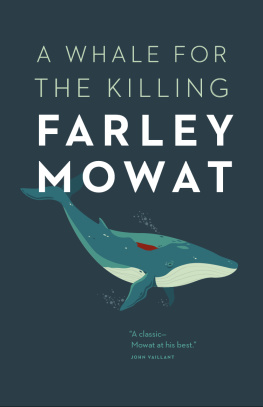Mowat - The Dog Who Wouldnt Be
Here you can read online Mowat - The Dog Who Wouldnt Be full text of the book (entire story) in english for free. Download pdf and epub, get meaning, cover and reviews about this ebook. City: New York;Saskatchewan, year: 1957;2009, publisher: McClelland & Stewart, genre: Non-fiction. Description of the work, (preface) as well as reviews are available. Best literature library LitArk.com created for fans of good reading and offers a wide selection of genres:
Romance novel
Science fiction
Adventure
Detective
Science
History
Home and family
Prose
Art
Politics
Computer
Non-fiction
Religion
Business
Children
Humor
Choose a favorite category and find really read worthwhile books. Enjoy immersion in the world of imagination, feel the emotions of the characters or learn something new for yourself, make an fascinating discovery.

- Book:The Dog Who Wouldnt Be
- Author:
- Publisher:McClelland & Stewart
- Genre:
- Year:1957;2009
- City:New York;Saskatchewan
- Rating:5 / 5
- Favourites:Add to favourites
- Your mark:
- 100
- 1
- 2
- 3
- 4
- 5
The Dog Who Wouldnt Be: summary, description and annotation
We offer to read an annotation, description, summary or preface (depends on what the author of the book "The Dog Who Wouldnt Be" wrote himself). If you haven't found the necessary information about the book — write in the comments, we will try to find it.
The Dog Who Wouldnt Be — read online for free the complete book (whole text) full work
Below is the text of the book, divided by pages. System saving the place of the last page read, allows you to conveniently read the book "The Dog Who Wouldnt Be" online for free, without having to search again every time where you left off. Put a bookmark, and you can go to the page where you finished reading at any time.
Font size:
Interval:
Bookmark:
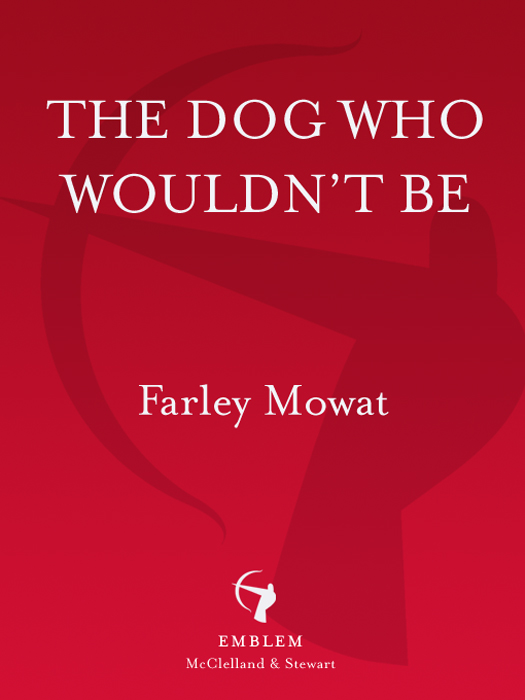
BOOKS BY FARLEY MOWAT
People of the Deer (1952)
The Regiment (1955)
Lost in the Barrens (1956)
The Dog Who Wouldnt Be (1957)
Coppermine Journey (editor) (1958)
The Grey Seas Under (1959)
The Desperate People (1959)
Ordeal by Ice (1960)
Owls in the Family (1961)
The Serpents Coil (1961)
The Black Joke (1962)
Never Cry Wolf (1963)
Westviking (1965)
The Curse of the Viking Grave (1967)
Canada North (illustrated edition 1967)
The Polar Passion (1967)
Canada North Now (revised paperback edition 1967)
This Rock Within the Sea (with John de Visser) (1968)
The Boat Who Wouldnt Float (1969)
Sibir (1970)
The Siberians (1971)
A Whale for the Killing (1972)
Tundra (1973)
Wake of the Great Sealers (with David Blackwood) (1973)
The Snow Walker (1975)
And No Birds Sang (1979)
The World of Farley Mowat (edited by Peter Davison) (1980)
Sea of Slaughter (1984)
My Discovery of America (1985)
Virunga: The Passion of Dian Fossey (1987, renamed Gorillas in the Mist, 2009)
The New Founde Land (1989)
Rescue the Earth! (1990)
My Fathers Son (1992)
Born Naked (1993)
Aftermath (1995)
A Farley Mowat Reader (edited by Wendy Thomas) (1977)
The Farfarers (1998)
High Latitudes (2002)
Walking on the Land (2002)
No Mans River (2004)
Bay of Spirits (2006)
Otherwise (2008)
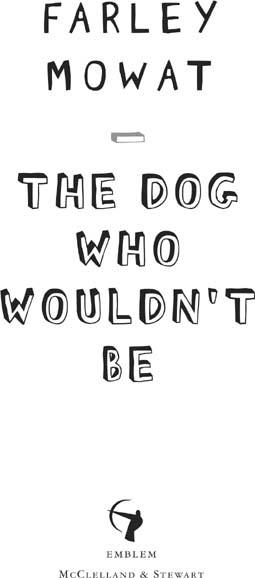
For my parents,
who made the hours of my youth.
And for Mutt,
who shared that time with me.
12 Squirrels, Scotsmen, and Some
Other Beasts
THE COMING OF
MUTT
 n oppressive darkness shadowed the city of Saskatoon on an August day in 1929. By the clock it was hardly noon. By the sun but the earth had obliterated the sun. Rising in the new deserts of the southwest, and lifting high on autumnal winds, the desecrated soil of the prairies drifted northward; and the sky grew dark. In our small house on the outskirts of the city my mother switched on the electric lights and continued with the task of preparing luncheon for my father and for me. Father had not yet returned from his office, nor I from school. Mother was alone with the somber day.
n oppressive darkness shadowed the city of Saskatoon on an August day in 1929. By the clock it was hardly noon. By the sun but the earth had obliterated the sun. Rising in the new deserts of the southwest, and lifting high on autumnal winds, the desecrated soil of the prairies drifted northward; and the sky grew dark. In our small house on the outskirts of the city my mother switched on the electric lights and continued with the task of preparing luncheon for my father and for me. Father had not yet returned from his office, nor I from school. Mother was alone with the somber day.
The sound of the doorbell brought her unwillingly from the kitchen into the hall. She opened the front door no more than a few inches, as if expecting the menace of the sky to thrust its way past her into the house.
There was no menace in the appearance of the visitor who waited apologetically on the step. A small boy, perhaps ten years of age, stood shuffling his feet in the gray grit that had been falling soundlessly across the city for a day and a night. He held a wicker basket before him and, as the door opened, he swung the basket forward and spoke in a voice that was husky with the dust and with the expectation of rebuff.
Missus, he asked in a pale, high tone, would you want to buy a duck?
Mother was a bit nonplussed by this odd echo of a catch phrase that had already withered and staled in the mouths of the comedians of the era. Nevertheless, she looked into the basket and to her astonishment beheld three emaciated ducklings, their bills gaping in the heat, and, wedged between them, a nondescript and bedraggled pup.
She was touched, and curious although she certainly did not want to buy a duck.
I dont think so, she said kindly. Why are you selling them?
The boy took courage and returned her smile.
I gotta, he said. The slough out to the farm is dry. We ate the big ducks, but these was too small to eat. I sold some down to the Chinee Grill. You want the rest, lady? Theyre cheap only a dime each.
Im sorry, Mother replied. Ive no place to keep a duck. But where did you get the little dog?
The boy shrugged his shoulders. Oh, him, he said without much interest. He was kind of an accident, you might say. I guess somebody dumped him out of a car right by our gate. I brung him with me in case. But dogs is hard to sell. He brightened up a little as an idea struck him. Say, lady, you want him? Ill sell him for a nickel that way youll save a nickel for yourself.
Mother hesitated. Then almost involuntarily her hand went to the basket. The pup was thirsty beyond thirst, and those outstretched fingers must have seemed to him as fountains straight from heaven. He clambered hastily over the ducks and grabbed.
The boy was quick to sense his advantage and to press it home.
He likes you, lady, see? Hes yours for just four cents!
Less than a month had elapsed since my parents and I had come out of the verdant depths of southern Ontario into the arid and dust-shrouded prairies.
It had seemed a foolhardy venture then, for those were the beginnings of the hard times, even in the east; while in the west the hard times the times of drought and failure were already old. I do not know what possessed my father to make him exchange the security of his job in Windsor for a most uncertain future as Saskatoons librarian. It may be that the name itself, Saskatoon, Saskatchewan, attracted him irresistibly. It may have been simply that he was tired of the physical and mental confines of a province grown staid and stolid in its years.
In any case he made his decision in the fall of 1928, and the rest of us acquiesced in it; I, with a high heart and bright anticipation; Mother, with grave reservations and gloomy prophecies.
Father spent that winter building a caravan, a trailer-house which was destined to carry us westward. It was a long winter for me. On Saturdays I joined my father under a shed and here we hammered and sawed industriously, and the caravan took shape. It was an unconventional shape, for my father was a sailor at heart and he had had but little experience in the design of land conveyances. Our caravan was, in reality, a houseboat perched precariously on the four thin wheels of an old Model T chassis. Her aspect was bluff and uncompromising. Her sides towered straight from the frame a full seven feet to a gently cambered deck (which was never referred to as a roof). She was big-boned and buxom, and she dwarfed poor Eardlie our Model A Ford convertible as a floating derrick dwarfs the tug which tows it.
Some of Fathers friends used to come by now and again to watch our progress. They never said much, but when they went away it was with much thoughtful shakings of their heads.
Perhaps our caravan was no thing of beauty, but she was at least a thing of comfort. My father was an ingenious builder and he had fitted her cabin with every nautical convenience. There was a compact galley with a primus stove on gimbals, gimbaled lamps, great quantities of locker space, stowage for charts, a Seth Thomas chronometer on the forward bulkhead, two luxurious berths for my parents, and a folding pipe-berth for me. Dishes, our many books, and other loose oddments were neatly and securely racked in fitted cupboards so that even in the wildest weather they could not come adrift.
Font size:
Interval:
Bookmark:
Similar books «The Dog Who Wouldnt Be»
Look at similar books to The Dog Who Wouldnt Be. We have selected literature similar in name and meaning in the hope of providing readers with more options to find new, interesting, not yet read works.
Discussion, reviews of the book The Dog Who Wouldnt Be and just readers' own opinions. Leave your comments, write what you think about the work, its meaning or the main characters. Specify what exactly you liked and what you didn't like, and why you think so.

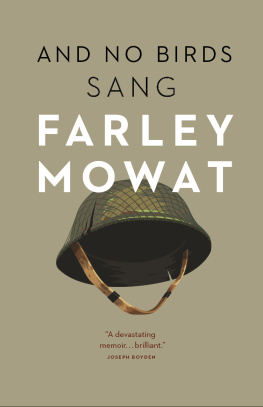
![Farley Mowat - People of the Deer [Paperback]](/uploads/posts/book/52958/thumbs/farley-mowat-people-of-the-deer-paperback.jpg)
